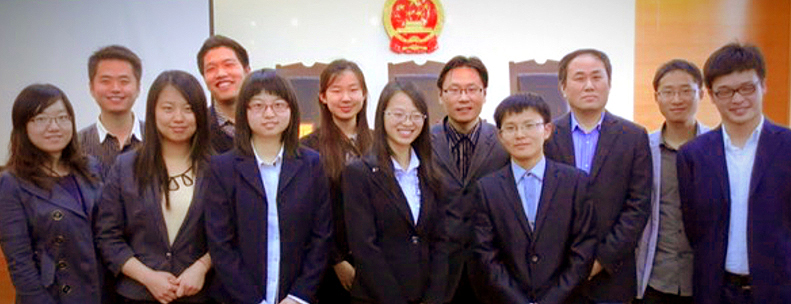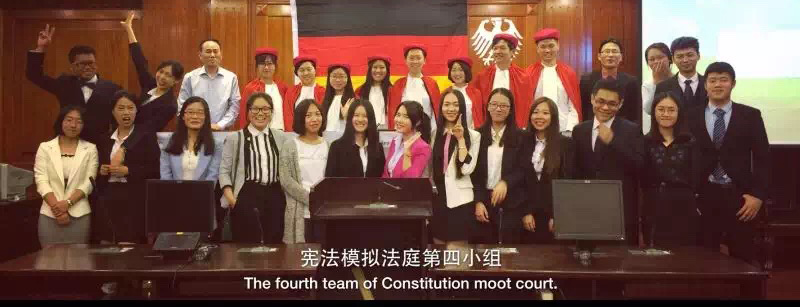With its Constitution and Constitutional Litigation courses, the China-EU School of Law (CESL) proves to be a pioneer in Chinese legal education. These courses combine lectures with practical exercises in simulated court proceedings, so-called moot courts. Moot courts usually only appear as an extra-curricular activity or competition in Chinese law teaching. A small number of colleges and universities offers such moot court courses, but most of them are confined to the existing Chinese proceedings, where as CESL’s courses also look at Anglo-American and European proceedings. Some people describe the Chinese constitution as a paper tiger due to the absence of constitutional litigation, but the road to law-based governance and law-based administration is inseparable from the application of the constitution and these moot courts show how effective constitutional litigation can work and prepare us students for future constitutional judicature.
CESL’s Constitution and Constitutional Litigation courses have been established in 2011 by Prof. Zheng Yongliu and teacher Dr. Yu Fei, are part of the Chinese Law Master’s programme. The Constitutional Moot Court has also been hosted since then. Each year, the cases are selected by the teacher, and then students are divided into different groups. Each group is responsible for one case. Students are required to recapitulate the particular circumstances and start the moot court on the basis of the original case. Each member of the group performs its own duties as a client, a judge or an attorney, and prepares the relevant documents according to the identity; in the following, they collaborate with other team members to complete the preparation of the entire moot court. In order to ensure that the moot court runs smoothly, each group discusses the legal issues brought up in the cases repeatedly in the preparation process; additionally, court trial procedure also is trained before the court, sometimes even up to three times.
In the early period of the course, the trial procedure is held in accordance with the existing Chinese administrative litigation law. But in order to explore the feasibility of the constitutional litigation procedure, students later try to learn from the civil law system and the European and Anglo-American systems of constitutional litigation procedure. “In 2015, two groups even drafted a Chinese Constitutional Procedural Law based on the final choice of procedure form for moot court.” student Kong Hao tells. In order to introduce the case and its issues in detail, each group compiles the documents into a pamphlet. One case once had more than ninety pages of materials.

After each moot court, an academic discussion is set up, in which students can raise questions about the plaintiff and the defendant and discuss the application of constitutional law and the legal theories raised by the case.“Many students come up with thought-provoking questions discussing new perspectives, which can further deepen their understanding of constitutional theories.” Dr. Yu Fei says. Generally, the teacher grades each group daily and the scores are added to the students’ total score in the Constitution and Constitutional Litigation courses.
The choice of cases has always been focused on China's current situation. Students worked with existing cases or real events to discuss constitutional issues such as discrimination in respect of employment, protection of citizens' property, freedom of expression and freedom of artistic creation.
In both 2011 and 2013, students worked on the “Pengshui case”, which was a landmark case about the protection of the freedom of expression of Chinese citizens. In the case, the civil servant Qin Zhongfei sent a text message to satirize the incumbent county magistrate and county party secretary of Pengshui County. This text message was forwarded intensively in the county. In the end, the magistrate filed a lawsuit on the ground of infringement of reputation. During the moot court, students discussed whether the text message constituted a violation of the plaintiff’s reputation right and whether the freedom of expression exercised by Qin Zhongfei was covered by the perspective of the basic rights named in the constitution. In addition, they also debated which one is more important, the defendant's freedom of expression or the plaintiff's reputation right.
In 2015, students dealt with latest current case of the German Constitutional Court in which the German Federal Council had petitioned for a ban of the far-right “German National Democratic Party” (NDP). In the moot court, a group of students who were concerned about the constitutional litigationin China and who tried to explore the Chinese constitutional judicature expressed their opinion on the case. Students in plaintiff and defendant groups discussed a series of issues concerning the case, for example, whether the theory of democratic self-defenceand the applicability of the party prohibition clause should change in time; and whether NDP has actual political influence. In the end, the judgemade aconclusive judgment that the NPD did not violate the constitution in the ratio of 5 to 3, and issued three objections.

The moot court is a good teaching method combining theory with practice. On the one hand, it cultivates students' legal thinking. As Shao Yufei, students of 2014, says; "The significance of constitutional litigation moot court reaches far beyond the legal issue discussed, it rather directs us to study and do things in depth." On the other hand, the moot court encourages to learn theory in practice. Li Zhipeng, students of 2015, stresses: "Constitutional litigation moot court, especially the case about the dissolution of the German National Democratic Party made me feelthat the constitution is very interesting and attractive. German constitutional theory is rich and colorful, I hope to continue the study in the future.”
Article by Feng Bo, CESL student
